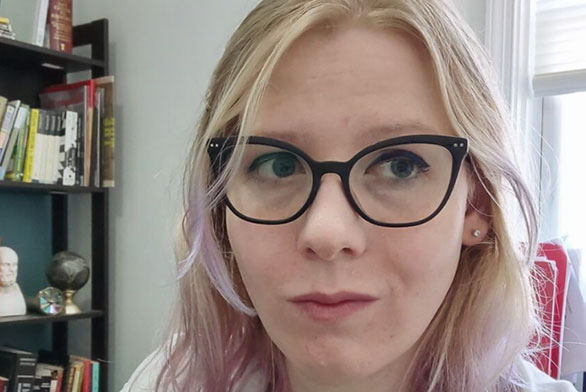Siobhán Petersen (AGI23) is Pushing Forward on the Philosophy of AI
June 13, 2023 | By M. W. Merritt (SF22)
Could our devices be considered conscious? Drawing inspiration from the liberal arts, Petersen tackled this question by melding classic philosophy with core computer science concepts.
Siobhán Petersen (AGI23) was always a fan of asking deep questions, which is what ultimately led her to the Graduate Institute at St. John’s College. There she used philosophy as a springboard for exploring a discipline not ordinarily associated with the liberal arts: computer science.

Petersen, who completed her master’s degree this past spring, began her academic journey at Anne Arundel Community College and graduated from the University of Baltimore in 2018 with a degree in jurisprudence. While working as a student teacher at Philosophy Camp for Teens, a summer camp held by the university’s Hoffberger Center for Professional Ethics, she encountered a St. John’s College alum and learned about the Program. Its interdisciplinary nature stuck with her, and she applied to the Graduate Institute in 2021. The experience proved to be a perfect fit.
“I’m a huge proponent of Socratic seminars, and I love how interdisciplinary the Program is,” says Petersen. “The other programs I applied to were about philosophy, and in the English-speaking world, if you want a philosophy degree, it’s hard to get beyond a narrow subsection of analytic philosophers. The first section I took was math and science, and nothing was off-limits. I could talk about my weird fascinations that weren’t necessarily science or philosophy–anything worked if it made sense in the conversation.”
Petersen became inspired to write "How Might a Machine Intend” for her GI preceptorial, a mandatory class in which students study a single book, topic, or question and then complete a major essay related to it. Her preceptorial essay explores an ancient yet contemporary issue: defining thought and consciousness. “I was looking for a framework where we might be able to say if a computer is conscious or thinking, or whether it has intentions,” says Petersen. The work is heavily influenced by classical thinkers such as Aristotle and computing pioneers like John Rogers Searle, creating a blend of formal philosophy and core computer science.
The paper’s basic argument looks at computing, defined as the ability to hold information and follow logical instructions, and asks what else would be needed for intelligence. Understanding (the ability to conceptualize a process) and intending (the ability to feel, have goals, and create one’s own logical instructions) are layers on top of computing and are hallmarks of our conscious minds. Using examples such as DNA—inanimate matter that can compute and a machine that must sustain itself—that could be said to intend, Petersen bridges the gap between sentient beings and inanimate matter, calling into question our understanding of consciousness and the universe as well as the future development of AI.
Petersen presented “How Might a Machine Intend” at the University of Baltimore in March of this year, and at St. John’s Commencement this past spring, she was one of two GI students honored for having written a distinguished preceptorial essay. She is currently seeking future conference opportunities while collaborating with 14 West, a business services firm in Baltimore, on how best to utilize AI. Future career goals involve teaching or working in communications, as well as sharing the liberal arts experience with others.
Time at the Graduate Institute provided Petersen with a deeper understanding of computing. “We use computers every day, but there’s a gap between most end users and understanding what’s going on,” Petersen says. She feels that being able to reach outside the boundaries of computer science into other disciplines and the ability to communicate these concepts in a more general way is an important asset: “I see a lot of desire in the general public for someone to explain what’s going on with AI and how we should feel about it that isn’t happening. I hope that is a niche I can fill.”

